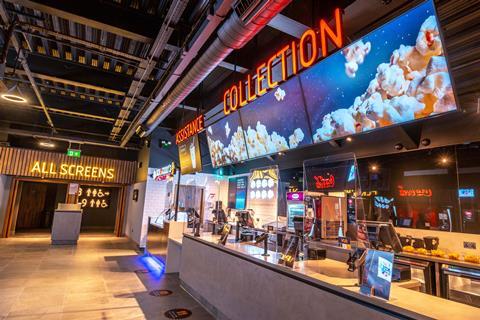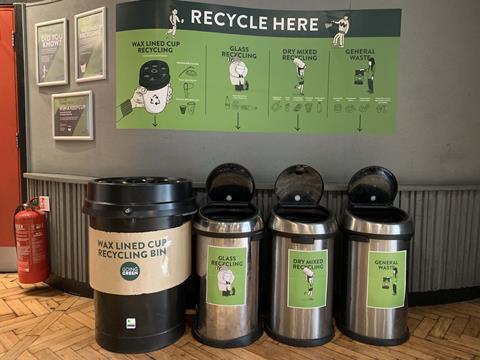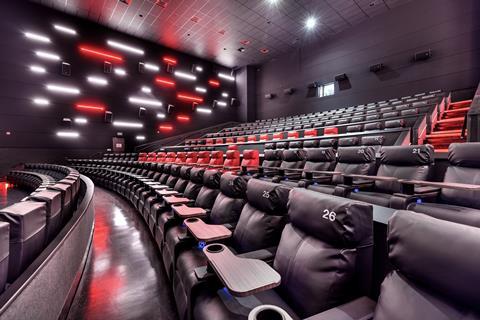[ad_1]
On the face of it, cinemas hardly suggest themselves as beacons of sustainability best practice. Operators seeking to reduce their carbon footprint and approach net zero evidently face big challenges: large buildings open every day of the week for long hours, at low occupancy rates for many of those hours, and serving outsize portions of non-nutritious food, typically in packaging that is difficult to recycle.
But they are trying — and not just the smaller independent operators, which might benefit from a crusading leadership team, as well as a customer base that puts environmental responsibility high on their list of priorities. Large multiplex chains, which have quietly been focusing on energy efficiency for many years now, are looking at sustainability in a broader context — prodded forwards by government regulation that is either already announced or anticipated.
“Issues around environmental impact and sustainability have reached the time to come truly front and centre for our industry,” comments Phil Clapp, CEO of national trade body UK Cinema Association (UKCA). “Spiralling energy costs over the last year have brought a renewed focus on efficiency, but so too has the increasing external pressure on our sector, as on so many others, to act.”
Clapp made these remarks in his introduction to the UKCA’s annual conference in London in March, ‘Greening the Big Screen Experience’ — two days of panels and presentations sharing current best practice in the exhibition industry, as well as ideas for future pathways. The fact that the association chose to make sustainability the exclusive topic for the event — rather than, as one panellist suggested might have formerly been the case, “a single session in the afternoon on day two” — tells its own story about the urgent focus cinema operators are giving it.
Long-term plans
Multiplex chains are increasingly realising they need coherent strategies to achieve better sustainability — and thus they need experts in the field to develop and implement them. The AMC Theatres-owned Odeon Cinemas Group, for example, which operates venues under different brands in the UK, Ireland, Italy, Germany, Portugal, Spain and the Nordic countries, has this year made two new staff hires: Lee Gullick, a sustainability expert with 20 years’ experience in the field, including as a consultant and at Bromley London Borough Council; and Alice Tumidei, a data analyst working on energy reduction strategies.
Odeon Cinema Group operations performance and development director Martin Waller sits on the company’s ESG (environmental, sustainability, governance) committee and leads on energy and sustainability. “The approach we’ve taken is that what we need is a long-term net-zero plan,” he tells Screen International ahead of the conference. “But when we started looking at that net-zero plan, we realised it is extraordinarily complicated. It needs a proper programme. How do you get your baseline, define your goals, targets and measures?”
The new staff hires will be engaged in establishing those benchmarks and devising that strategy, but in the meantime Odeon has already effected changes that it intuits are steps in the right direction.
“While energy is a big part of our broader net-zero journey, the here-and-now is everything we can do to save energy that is both good for our path to net zero, and there’s a financial gain,” says Waller. Odeon’s Project Power initiative is about “engaging our cinema teams across the group with the things they can do”, he adds.
In the UK and Italy, the company is rolling out voltage optimisation, which eliminates fluctuations in the power supply, and saves about 5% in energy costs. Intelligent building management systems (BMS) in newer-build cinemas ensure that heating, ventilation and air conditioning (HVAC), lighting, digital signage and projection equipment are switched on locally as needed across the multiplex — rather than all at once. The energy management system monitors usage at every point to help teams identify potential efficiencies.
The flipside is that energy usage is not always on a downwards trend. “We have built new food and beverage offers, which start introducing ovens,” explains Waller. “We’ve introduced recliner seats, which are powered. All the time we are adding things which enhance the guest experience, but they typically use power.”
In the past, rival cinema chains worked independently on energy conservation and waste management — albeit often arriving at similar conclusions and practices. Increasingly, the talk is of collaboration — a spirit in part fostered since 2019 by the creation of the UNIC Circular Economy Group, led jointly by European cinema trade body UNIC and the Coca-Cola Company, and addressing the use and recycling of food and beverage packaging in cinemas.

Claire Arksey, who joined Vue International as COO last year after a career in the retail industry, appreciated the “small, impactful, very good efforts” in the nine countries where the company operates under various brands: the UK, Ireland, Denmark, Germany, Italy, Poland, Lithuania, the Netherlands and Taiwan. A Vue climate team has been established to share best practice across the company and within the wider industry, with facilities manager Mike Flint elevated to a group role to lead these efforts.
“Short term we’re doing a lot of good things that make our customers [and] employees feel good,” says Arksey. “Longer term we need to come together — we’re only going to make change, particularly with government and local councils, if we’re all together.
“We’re all starting to meet,” she continues. “We want to be very involved, and if we can get into some accreditation in the future, it can get us to really say, ‘This is important for us as an industry.’”
Vue has been on the same journey as Odeon, and Flint dates that back to 2011-12 in the case of the UK, when the company began looking for “low-hanging fruit” in energy savings — bringing in voltage optimisation and more efficient building management systems. HVAC is the number-one energy user for a cinema, typically accounting for about 70% of use, so variable frequency drives in the fans can bring a big saving — with adjustments made depending on the seat occupancy of an individual auditorium.
“We are now looking at older BMS systems, and we’ve set aside a capex [capital expenditure] sum of money to invest this year to bring them into the 21st century,” says Flint. “Based on the monitoring we do on a weekly basis, it’s highlighting those cinemas where we can make further improvements.”
Vue introduced waterless urinals across the estate in 2012-13 — and is enthusiastic about the outcome. While there is slightly more cost in maintenance, says Flint, there is a big saving in water and sewage charges. “It is so much better for the environment, as we’re not wasting good, clean water,” he adds.
Vue is now discussing water temperatures, and what would be acceptable for guests, as well as automatic flow times for the taps, and Flint and Arksey are working with Ruth Hinton, the company’s group head of customer experience and insight, for guest input. “We have a lot of passionate discussions,” says Arksey. “Toilets are the most talked about thing with consumers on surveys, and it does tell you whether your experience has been good or not. We’re going to work a lot with Ruth on what the customer feels is okay.”
On recycling and waste management, “the most important thing is the collaboration, not just with our suppliers, but with all the cinema exhibitors,” says Flint, adding that he met with Odeon and waste management company Biffa to discuss strategies and collaboration on waste management.
Making a plan
While energy efficiency might be the big win for the company bottom line, recycling and waste are the topics that have the biggest focus for the in-cinema teams — since these employees prepare and sell food and beverages, clean auditoriums and deal with the waste that accrues.
“We’ve not really got feedback from guests, or any external bodies about our waste or recycling,” says Odeon’s Waller. “Where we hear it from, and why we’re passionate to do something, is because it’s what our teams talk about. They touch everything. They move our products around. They’re the ones who clean up screens, they’re the ones who are like, ‘What’s our plan?’”
Waller’s view is echoed by Flick Beckett, who heads the green steering group at Cineworld Group-owned Picturehouse Cinemas. The company’s “reduce, reuse, recycle” strategy was “a campaign led from staff feeling horrible about throwing away,” she explains, with reference to single-use cups. “I felt it was quite abusive to expect people to do it.”
Picturehouse’s cinemas typically have bars and restaurants, and so are well-positioned to wash glass and plastic. “We don’t use single-use plastic throughout our general day-to-day use,” says Beckett — with the proviso that “for a big event, if we’re showing World Cup football where there’s going to be a lot of beer drunk, then we would have to get in some plastic cups.”

Picturehouse has a contract with waste management company WM101, which then brokers waste via local authority schemes. “So we are very dictated by what is available in each area,” says Beckett. “As a company, we are willing to recycle whatever we can, but we have to work within the confines of what’s available.” In Brighton, for example, where Picturehouse has two cinemas, “it’s very basic what you can recycle” — perhaps surprising, since the city is represented by a Green Party MP in Parliament.
For hot beverages, Picturehouse promotes ‘keep cups’, and also encourages guests to bring water bottles “and we refill them, happily”, says Beckett. “We did a keep cup sale before Christmas, we give them away in competitions,” she adds. At the busy Clapham cinema, recycling options are available locally for single-use wax-lined coffee cups. The company has just launched a new campaign — with an in-cinema trailer, competitions and eco community board — to promote recycling of these receptacles. “If it’s successful, we’ll roll it out across the other cinemas.”
In the holy trio of sustainable actions for packaging — reduce, reuse, recycle — Beckett is clear that recycling is the least desirable. “I don’t want people to think that, ‘Oh, it’s being recycled, that’s fine.’ It’s not.”
Germany is ahead of the UK on this front, and cinemas must offer customers the option of a reusable cup. Venues that were not previously geared up for that policy must now wash and dry those cups onsite, or send them offsite to be cleaned. Odeon, which operates as UCI in Germany, is trying both options. Dry times are a big challenge onsite — unlike glass and crockery, which reaches high temperatures in dishwashers, moisture does not evaporate so easily from plastic at the end of wash cycles. Wastage and loss is another challenge, although expected to decline over time. “We’re trying to learn — how many use them, how many take them home, how many put them in the trash?” says Waller.
Odeon is also trialling one German cinema where the reusable cup is the only one offered — anticipating the day when this will be mandatory. “We’re prepping Sweden because legislation in Sweden is [coming] fairly soon,” notes Waller.
Nordic countries already operate deposit return schemes (DRS) on drinks bottles, including plastic, and these are coming to the UK and Ireland, beginning with Scotland in August. At the UKCA conference, a presentation on the legislation by Britvic Soft Drinks commercial sustainability manager Louise Wright brought more delegate engagement — and questions — than any other session, indicating the concerns for UK cinemas, especially smaller operators typically run by tiny teams, and with limited storage space. Ireland will follow Scotland in February 2024, with England, Wales and Northern Ireland all set to implement DRS in October 2025.
In England, single-use plastic trays, bowls and cutlery, plus certain types of polystyrene cups and food containers, will be banned from October this year. In cinemas, nachos are traditionally served in plastic trays, and chains are considering cardboard and compostable options. Both have downsides — cardboard may become contaminated by sauce, while the term ‘compostable’ does not necessarily mean items can go into food waste. “Compostable cups are industrially compostable,” says Picturehouse’s Beckett. “It’s not that they’re not compostable, it’s just that it’s really difficult to do it.”
Practice makes perfect
At Picturehouse, the East Dulwich theatre in south London has achieved the best recycling rate across the group, with 76% of waste recycled, 24% sent for energy from waste, and 0% to landfill. Greenwich achieves 64% recycling, 28% sent for energy from waste, and 8% to landfill. Despite the keen focus on sustainability, which seems well-aligned with Picturehouse’s preferred brand positioning as “neighbourhood” (rather than “boutique”) cinemas, Beckett is keen to emphasise that “I know Picturehouse isn’t perfect, and that we’ve got a long way to go”.
Other chains are singing from the same hymn sheet. “I don’t want to come across as, ‘We’ve cracked it all,’” says Odeon’s Waller. “There is a roadmap but it’s fraught with cost and complexity. And then legislation is moving on some of these things, which we’re reacting to as well.”
Adding to the complexity is consideration of carbon emissions across scope one, two and three, as defined by the Greenhouse Gas Protocol, which measures and manages greenhouse gas emissions. In the case of cinemas, scope three emissions (which are produced by customers and suppliers) cover categories such as food and beverage sold at concessions stands, and transportation of guests and goods to the venue — and form the majority of all emissions for the exhibition industry, according to studies. Cinema operators can site venues next to public transport (as opposed to out-of-town retail parks), and they can bring portion size and price into alignment at concession stands (so that customers are not encouraged by pricing to buy supersize portions), but achieving net zero will be an enormous challenge if scope three emissions are included in calculations.
In many other sectors, industry-wide bodies already exist to bring companies together and evolve pathways towards solutions. The cinema industry has yet to establish such a body in the UK, although talks are ongoing at the UKCA and the equivalent trade federation representing distribution — the Film Distributors’ Association — as well as cross-sector body Cinema First. Clapp points out that new staff hires at major multiplex circuits are only now finding their feet, while also conceding that “we can’t afford to sit and wait for everything to fall into place before we start doing stuff”.
CinemaCon in April is taking attention in the immediate term, says Clapp. “But certainly between now and CineEurope [June 19-22], there will be a lot of activity to try and bring things to some kind of structure.”
CASE STUDY: Cinecitta Nuremberg in Gemany

Considering Nuremberg is only the 14th biggest city in Germany by population size, it is perhaps surprising it supports a cinema of such scale and success as the family-owned Cinecittà. Offering 23 screens, a bookshop, three restaurants and bar areas, it is the largest cinema by footprint area in Germany and ranks second nationally for box office.
The Cinecittà is also ahead of the game when it comes to sustainability and energy, having begun the process of measuring usage and implementing efficiencies more than a decade ago — including the construction of its own adjacent power plant.
However, when the cinema reopened after the Covid pandemic, the sprawling venue saw energy usage increase. “We had our HVAC on the maximum setting,” explains chief technical officer Benjamin Dauhrer. “We would use a lot of fresh air, and on high settings to make sure we have good circulation of outside air.”
Russia’s invasion of Ukraine in February 2022 and the spike in energy costs saw renewed efforts on efficiency, and with a forensic approach to building management systems, Cinecittà was able to reduce by a third from an annual 3 million kilowatt hours of power usage to 2 million.
The next big project is the conversion of the power plant from natural gas to renewables. The cinema is currently installing solar panels on its roof, capable of generating 370 kilowatts at peak and covering about 20% of total energy consumption. The Cinecittà is located beside Nuremberg’s River Pegnitz, and an even bigger win will be the construction of the cinema’s own hydraulic power plant — aiming to open in 2024 or 2025. “Hydraulic power plants usually generate more energy in winter than in summer when water in the rivers is lower, so this will be a good fit to the solar installation,” says Dauhrer.
“It’s not that easy to get a hydraulic power plant built inside a medieval city centre, so there’s a lot of co-ordination with the local authorities,” he adds, which is why Cinecittà took over a previous abandoned scheme that had already won approval, so now it just needs permission for modifications. The target is to generate 80% of the venue’s power needs from water and sunlight.
One big advantage for Cinecittà, acknowledges Dauhrer, is that the cinema owns its building — and reaps all of the benefits from its investments in energy efficiency. “I think that’s where often some opportunity is missed for a lot of cinema operators — they rent, and they also rent the HVAC system. It might be hard to get the property owner on board, because the energy you save as an operator doesn’t have a big benefit on the property owner’s side. In contrast, we can take a more holistic approach.”
Charles Gant
CASE STUDY: Cinemark in North America

As the third-largest exhibitor in the US, Cinemark has 318 cinemas with nearly 4,400 screens in 42 states across the country, from Massachusetts in the east to California in the west. But it was the deregulation of the electricity market in its home state of Texas in the late 1990s that first prompted the company’s interest in sustainability.
Looking at new energy options and embarking on energy efficiency projects, says Cinemark US vice president of energy and sustainability Art Justice, was “a starting point” for a commitment that is now visible on three fronts.
Recycling, in both front-of-house and back-of-house situations, currently allows Cinemark to divert around 30% of its waste away from landfills. That figure could increase, Justice suggests, as organic composting becomes more prevalent in states such as California, Colorado and Texas.
Meanwhile, the company is encouraging customers to recycle in cinemas through initiatives such as running trailers on litter disposal. “Part of our goal is to educate people,” Justice explains. “It is a process, but it’s one that more and more people want to participate in.”
Cinemark’s moves in energy efficiency have included retrofitting buildings and parking lots with LED lighting, conserving water through fixture and irrigation retrofits and re-examining the HVAC systems that keep its cinemas cool during the stifling summer months in Texas and other southern US states.
HVAC changes have included the introduction of demand-control ventilation, which reduces the rate of outdoor air supply to partially occupied auditoriums, and the installation of variable frequency drives, which control AC fan speed by varying the frequency of the electrical input. The latter move, says Justice, “was huge, because by ramping down the speed of the fan we are able to save a tremendous amount of energy”.
Cinemark has also secured Leadership in Energy and Environmental Design (LEED) certification — the US green-building standard similar to the UK’s BREEAM rating — for four of its theatres. It is using those venues as a template for other projects. The certification is “not without cost, so it’s not something we would necessarily do on every project”, Justice reports. “But you take it as best practice and then use it as part of your commitment to continue those strategies.”
On a third front, Cinemark has made increasing use of renewable energy, allowing the company to fill 66% of its overall energy needs in 2022 from renewable sources. Solar panel installations at 24 cinemas across eight states have been one source, and Justice indicates the company may fit more if regulatory changes and incentives in states such as California help to further decrease the cost and increase the efficiency of solar energy.
Incentives, Justice says, encourage Cinemark to promote solar so that it becomes more efficient and eventually achieves “grid parity” — costing the same as, or less than, energy from conventional sources.
In deregulated states such as Texas, Cinemark has been able to supplement its solar supply by buying green energy. In 2018 it entered into a virtual power purchase agreement, under which a third-party financier pays for an energy project, benefits from credits and incentives, and sells the resulting power to an end user.
That agreement is an example of how Cinemark is going about its sustainability drive, Justice suggests. “We are always looking to advance our efforts in sustainability,” he says, “but we’re also looking to be more creative in the way we approach this.”
Sustainability commitment
The approach is intended to balance the drive for sustainability with the obligations that Cinemark — a public company listed on the New York Stock Exchange — has to its shareholders.
“We are looking at projects that are going to have a good financial return and help us achieve our commitment to sustainability,” Justice explains. Those two goals, he insists, are “not mutually exclusive”.
The approach might also end up being adapted beyond US shores. Though Justice is only responsible for the company’s sustainability efforts in the US, Cinemark does have an international division with 200 cinemas in 15 Latin American countries. “We have for a while been conferring with our international counterpart, comparing notes and sharing best practices,” says the exhibitor’s sustainability VP.
John Hazelton
!function(f,b,e,v,n,t,s)
{if(f.fbq)return;n=f.fbq=function(){n.callMethod?
n.callMethod.apply(n,arguments):n.queue.push(arguments)};
if(!f._fbq)f._fbq=n;n.push=n;n.loaded=!0;n.version=’2.0′;
n.queue=[];t=b.createElement(e);t.async=!0;
t.src=v;s=b.getElementsByTagName(e)[0];
s.parentNode.insertBefore(t,s)}(window, document,’script’,
‘https://connect.facebook.net/en_US/fbevents.js’);
fbq(‘init’, ‘1787080818148630’);
fbq(‘track’, ‘PageView’);
!function(f,b,e,v,n,t,s)
{if(f.fbq)return;n=f.fbq=function(){n.callMethod?
n.callMethod.apply(n,arguments):n.queue.push(arguments)};
if(!f._fbq)f._fbq=n;n.push=n;n.loaded=!0;n.version=’2.0′;
n.queue=[];t=b.createElement(e);t.async=!0;
t.src=v;s=b.getElementsByTagName(e)[0];
s.parentNode.insertBefore(t,s)}(window,document,’script’,
‘https://connect.facebook.net/en_US/fbevents.js’);
fbq(‘init’, ‘3254793074533493’);
fbq(‘track’, ‘PageView’);
[ad_2]
Source link
– Armessa Movie News
